Fancy colour diamonds have long been lauded as something of a ‘complete package’ for jewellery retailers and consumers.
The auction of these diamonds commands significant international media coverage. How does that impact consumers' perceptions of these diamonds and the jewellery they are set in?
Exceedingly rare, uniquely beautiful, and shrouded in mystery, these diamonds have enjoyed an enduring association with luxury and exclusivity.
Available in nearly all the colours of the rainbow, from deep blues to vibrant pinks and intense yellows, there’s a stone to appeal to the tastes of all jewellery designers and consumers.
It should be said, of course, that these auctions feature a different type of jewellery than you'd find, even in a high-end metropolitan jewellery store.
With that said, the question is, do these auctions increase interest among consumers in the less ‘exceptional’ yet still dazzling ‘everyday’ varieties of fancy colour diamond jewellery?
Indeed, the closure of the Argyle Diamond Mine in 2020 ignited a frenzy of fancy colour diamond jewellery purchasing.
Despite the impacts of a global pandemic, a wounded economy, and an embattled diamond industry in the following years, the passion for these stones remains strong.
On a recent trip to a jewellery fair in Hong Kong, I had an interesting conversation with an industry supplier about this enduring popularity.
While discussing the litany of issues the diamond industry faces, I asked Shubham Maheshwari of Kunming Diamonds if the fancy colour diamond trade was experiencing any associated ‘blowback’.
To my surprise, he told me the category has been largely sheltered from these issues.
Maheshwari explained that fancy colour diamond collectors are unusually passionate about these stones and eager to learn all they can.
It’s easy logic to follow - most people purchase diamond jewellery at one stage or another in their lives; however, the specific interest these consumers have in diamonds is often limited to that occasion.
Consider it like this: many people undertake extensive research before purchasing a diamond engagement ring; however, many may not purchase diamond jewellery again. After the purchase, the interest is subdued.
Fancy colour diamond jewellery, on the other hand, is a far more niche purchase. Maheshwari made another interesting point – that high-profile auctions drive the enthusiasm behind these stones.
“Auctions are still helping the industry significantly. They generate a lot of excitement and keep the enthusiasm for these pieces alive,” he explains.
Food for thought
It’s an interesting proposition – could some degree of the popularity of these rare and expensive diamonds be attributed to high-profile auctions and the media buzz they generate?
In many ways, it’s an easy case to make. Fancy colour diamonds are rare and their appearance at luxury auctions emphasises their exclusivity.
A closer examination reveals that, in terms of marketing, it’s something of a ‘double-edged sword’.
Auctions are usually reserved for unique luxury items, attracting buyers searching for something ‘special’.
When these auctions ‘break records’ – regardless of how overly specific the benchmarks might be - this could be perceived as validation of value, which in turn improves consumer confidence in the category.
As mentioned, auctions involving fancy colour diamonds frequently attract media attention coverage, particularly with the attendance of celebrities and persons of public note.
This exposure could spark interest among consumers who watch these events closely, and even more so among those easily influenced by trends and celebrity endorsements.
In a recent interview with Solitaire Magazine, Phillips worldwide head of jewellery senior specialist Benoît Repellin discussed the ‘modern make up’ of jewellery auctions in great detail.
He says that media attention around these auctions has attracted younger consumers to the market; however, he continues by suggesting that it’s a complicated issue.
“Today, the big jewellery collectors are more discreet. In recent times, jewellery is seen as a key fashion statement at red carpet events. But most of the pieces that the influencers, actors and actresses wear are loaned to them by jewellery maisons from either their heritage department or from new collections,” Repellin explains.
“It is good to see these jewels adorned and it does help generate interest in younger audiences, but we rarely see real influencers today who collect a lot of jewellery and wear it in public like how Elizabeth Taylor did in the old days.
He added: “Perhaps Jennifer Lopez is a potential influencer from modern times who owns a lot of interesting jewellery that she has worn in public.”
High-profile auctions include detailed descriptions and commentary on the diamonds being sold, and expert photographers and videographers showcase the stones' stunning visual appeal.
Many fancy colour diamonds have fascinating histories and backstories, and this context can be used to drum up additional interest among collectors.
This increased access to information could be considered a motivator for intrigue and interest among consumers, enhancing their appreciation and understanding of the category.
Finally, it would be folly to overlook these events themselves. The excitement and drama of an auction in a competitive atmosphere can drive consumer interest and engagement.
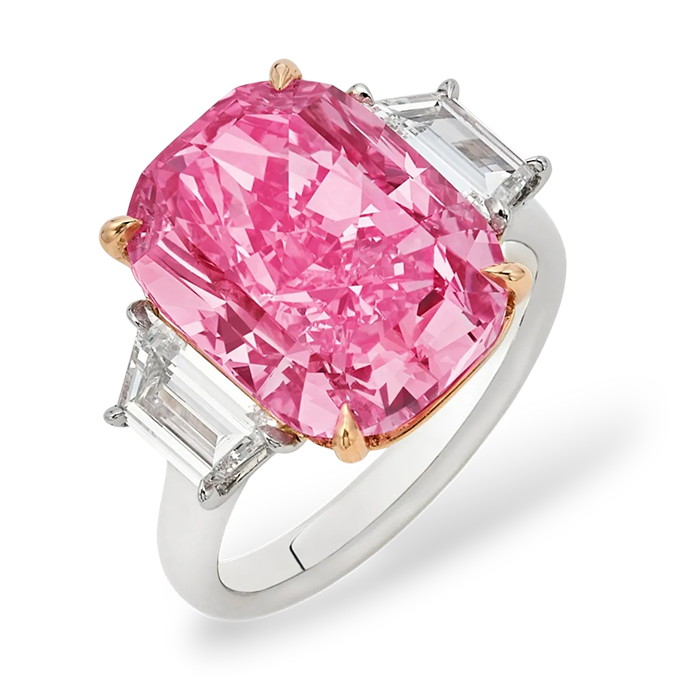 | 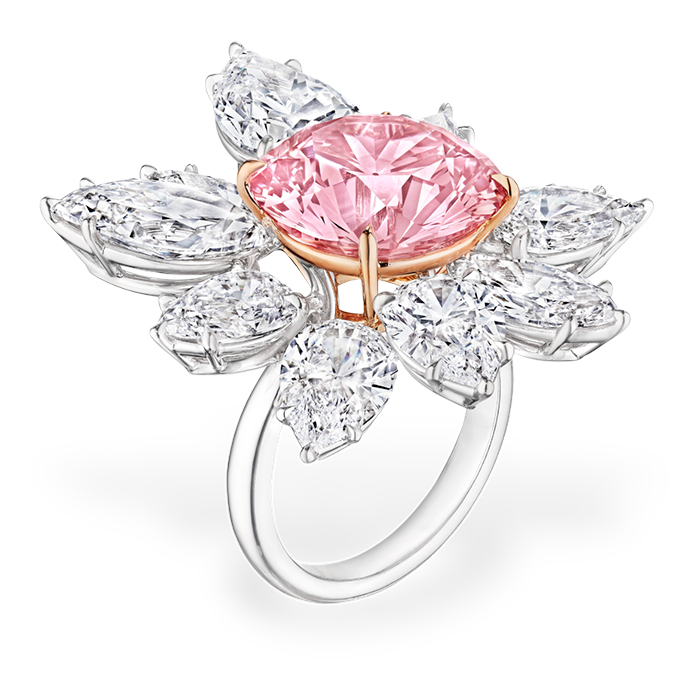 | 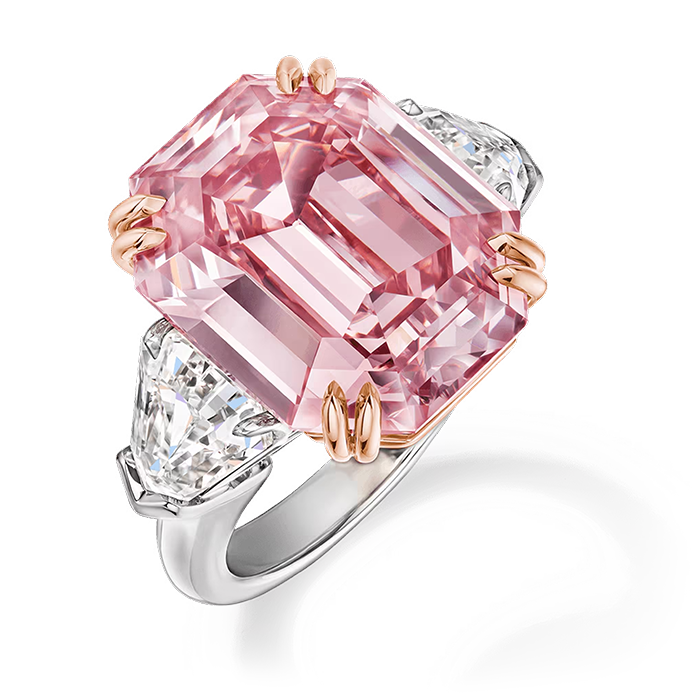 |
The Eternal Pink Sotheby's in New York | The Eden Rose Christie's in New York | Winston Pink Legacy Christie's in Geneva |
 | 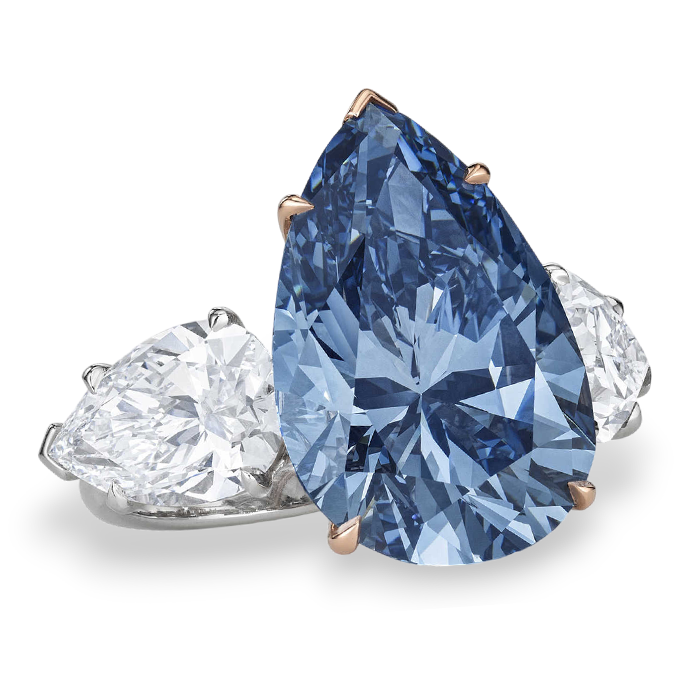 | 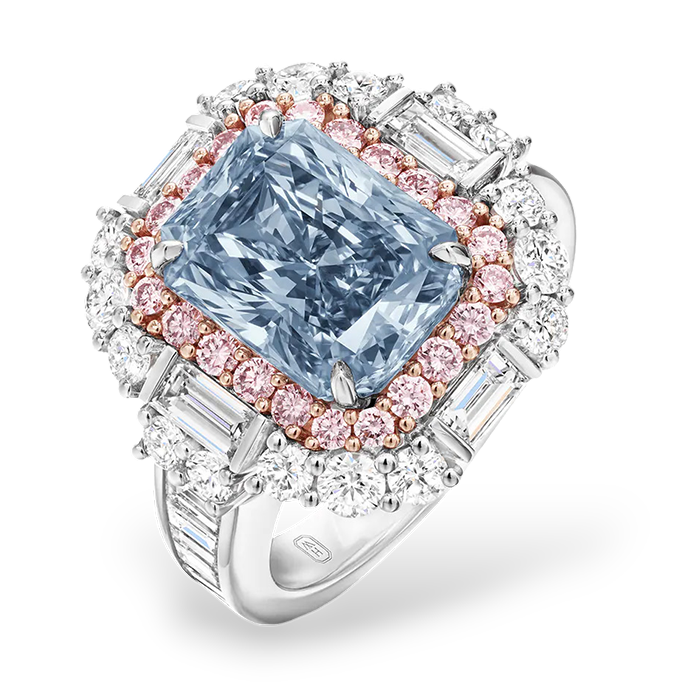 |  |
The Bleu Royal Christie's in Geneva | Blue Diamond & Pink Diamond Ring Harry Winston |
Newcomers join the party
Repellin says that an increasingly younger demographic is interested in jewellery auctions, mainly due to digital marketing.
“Most of the buyers in the jewellery auction world today are aged between and above 50 to 60 years. However, we are seeing a demographic shift with more younger clients showing interest in jewellery auctions. This shift is driven partly by the advent of online auctions and is more prominent in Asia and in some European countries, than in the US,” he added.
“The pandemic changed how people like to participate in auctions and brought about a popularity for online auctions. We invest a lot in digital marketing now.
"Our presence on social media has also allowed us to reach a broader range of clients. As of last year, about 40 per cent of jewellery buyers at Phillips auctions were aged 50 or below.”
As mentioned, it’s not all smooth sailing—jewellery and diamond auctions could be perceived as a ‘double-edged sword’ when it comes to promoting the category.
If a diamond or jewellery piece does not achieve its expected auction price or even falls short of previous records, it can negatively impact market perception.
As a recent example, an Argyle pink diamond was highly publicised ahead of a recent sale in Sydney.
The 0.94-carat radiant-cut fancy intense pink diamond was expected to generate tremendous attention among collectors.
In the lead-up to the sale, First State Auctions director Ari Taibel described the stone as the ‘most significant diamond’ his company has auctioned; however, it went unsold. There was a similar story in New York recently, when three fancy colour diamonds went unsold at Phillips.
A 45-carat, fancy vivid yellow stone, a 4-carat, fancy-intense-green diamond, and a 3-carat, light-blue set in a ring by Cartier each went unsold. The point to remember regarding these examples is that individual auctions are not emblematic of broader trends in the fancy colour diamond market.
That said, of course, it hasn’t been all bad news lately! A 202-carat yellow diamond, known as the Yellow Rose, impressed onlookers at Christie’s in Geneva, generating a $USD6.7 million return – the second-highest price for a stone of its size and colour for the auction house.
In the aftermath of the event, Max Fawcett, head of jewels for Christie’s in Europe, said, “There is nothing better as an auctioneer than a full and engaged saleroom, and to achieve such strong results is remarkable.”
He described the market for colour diamonds and gemstones as ‘on fire’ and said it was the best possible start to the auction season. Staying with Geneva, Phillips sold a 6-carat pink diamond for $USD12 million in May. At the same auction, the Argyle Phoenix, a 1.56-carat fancy red diamond, returned $USD4.2 million, nearly triple its estimate.
A 10-carat fancy intense pink diamond ring at Christie's in New York returned $USD13.3 million. Rahul Kadakia, international head of jewellery at Christie’s, said the Eden Rose “surpassed all expectations” and that collectors remain eager to pursue fancy colour diamonds.
High-profile auctions, boosted by media coverage, are attracting an increasingly younger demographic to the world of fancy colour diamonds. While successful sales may boost market confidence, unsold high-profile pieces could negatively impact perceptions. Recent notable sales indicate ongoing passion and enthusiasm in the market despite the occasional setback.
READ EMAG